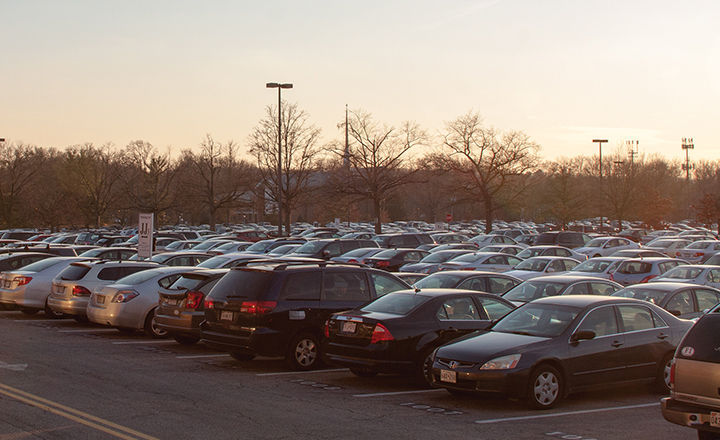
Lot 1 will be one of the parking lots affected by the Cole Field House renovation starting in December.
As the Cole Field House renovations approach, DOTS is planning to close several parking lots while the RHA continues working on a prioritization system to allocate parking to students.
Phase one of the $155 million project is scheduled to begin in late December, said Bill Olen, Facilities Management director of planning and construction.
The first lot affected by the first phase will be Lot Z, which includes about 20 spaces, said David Allen, Department of Transportation Services director. Lot 2G will also close for the construction of new tennis courts, slated to replace the ones by Cole that will be demolished during phase two of construction.
DOTS anticipates that phase two will eliminate 700 to 800 parking spaces, Allen said.
READ MORE: DOTS plans to eliminate parking for campus residents by fall 2017
However, Olen is optimistic that some parking will return after the new tennis courts are built.
“The footprint of the construction is larger than the actual courts,” Olen said. “There will be a loss of parking in Lot 2G, and we’re expecting construction of tennis courts as early as March 2016.”
Altogether, the renovations to Cole Field House and the construction of the Brendan Iribe Center — scheduled to begin in June 2016 — will eliminate 1,400 to 1,500 parking spaces, Allen said.
“We would need to change how parking happens on campus,” Allen said. “Right now, anyone who wants a permit can register for parking. There’s priority parking for employees, commuters and then resident parkers.”
Next year, freshman and sophomores who wish to bring a car on the campus must apply for an exception parking pass through the Residence Hall Association, Allen said.
RHA President Allison Peters and the RHA Transportation Advisory Committee are working to develop a system for freshmen and sophomores to appeal for permits next year.
“The system the RHA supports right now is a system that breaks it down into tiers,” said Peters, a senior government and politics major. “Medical and disability needs take first priority, and then seniority and, within that, [students with] jobs and lack of meal plans.”
The RHA Senate came up with this prioritization system, taking into account the responses of 191 resident students who responded to a parking survey, Peters said.
READ MORE: RHA passes initiative to shift parking priority, promote mini-fridge program
“I think that this is something people are really passionate about because they’ve gotten tickets or they are confused by the system,” Peters said. “[We must be] able to take into account everybody’s needs because there’s always a special circumstance.”
Peters said she expects backlash from the incoming sophomore class but thinks students will realize the benefits of the construction.
“RHA is so ingrained with the lives of the students, so it will be really easy for the representatives to connect with students and explain what is going on,” she said. “Once students see that the construction and the things taking away parking spots are ultimately bettering campus, they’ll understand it.”



